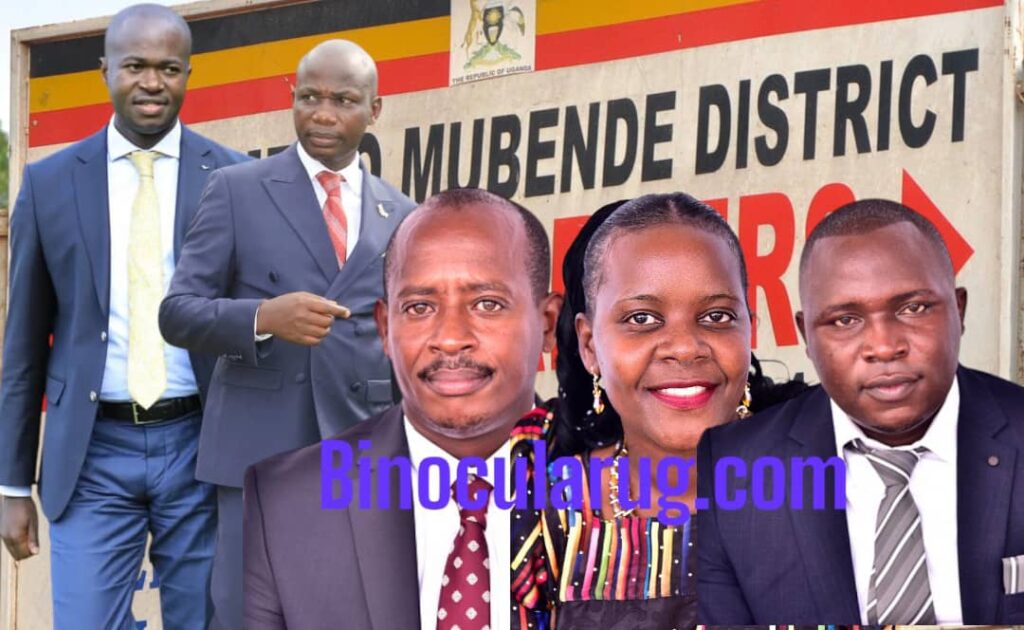By Amiri Wabusimba
Since the 2021 general elections, Mubende’s political landscape has been marked by a noticeable fracture within its elected leadership.
What once appeared as a unified bloc within the National Resistance Movement (NRM) is now splintering into competing factions, with the Municipal MP, Hon. Bashir Sempa Lubega, increasingly marginalized and politically isolated.
This subtle but growing discord, manifesting in public spats, strategic exclusions, and internal conflicts, could redefine the future of political leadership in Mubende district.
The glaring sign of this tension emerged with the controversial transfer of Mubende’s Resident District Commissioner (RDC), an event that was widely interpreted as a politically motivated reshuffling. In Uganda’s political environment, such transfers are rarely devoid of underlying power struggles.
The timing and circumstances that surrounded that transfer suggested a strategic realignment of power within the district’s leadership, signaling that not all was well within the NRM bloc.
This incident marked the beginning of what appears to be a deliberate effort to sideline Hon. Sempa Lubega, leaving him increasingly isolated from his colleagues.
Despite all five MPs representing Mubende being members of the NRM, internal alliances and loyalty networks, rather than party affiliation, have begun to define the political dynamics in the district.
It has become increasingly apparent that four of the MPs have coalesced into a unified bloc, while Hon. Sempa Lubega stands alone, politically estranged.
Such a division within the party calls into question the very nature of unity within the NRM in Mubende.
It raises critical concerns about whether the party’s cohesion is driven by genuine ideological alignment or simply the pursuit of power through strategic alliances.
This rift has been further exposed through a leaked audio recordings by Hon Sempa during a public events, where he voiced his frustration about being deliberately sidelined.
A notable instance occurred during the NRM Day celebrations in Mubende, where he, as the host MP, was denied an opportunity to speak.
Instead, Hon. Hope Nakazibwe woman Mp, a member of the rival faction, was appointed as the emcee, thus controlling the event’s narrative.
Such exclusions, coupled with public grievances, only serve to reinforce the perception that his colleagues are orchestrating a political marginalization of the municipal MP.
However, Hon. Sempa Lubega’s predicament is, in part, of his own making.
His critical stance against the NRM before the 2021 elections raised eyebrows and, for many, signaled a lack of genuine allegiance to the party.
His reluctance to embrace NRM symbols such as wearing the official party attire during major celebrations including the just concluded NRM liberation day commemoration further fueled suspicions about his commitment to the NRM’s cause.
This ideological inconsistency has only deepened the divide between him and his colleagues, making it easier for them to view him as a liability rather than an ally.
The fracture within Mubende’s parliamentary delegation is more than a personal dispute; it is a battle for political legitimacy.
The four allied MPs appear committed to consolidating their hold over the district, ensuring that power remains within their faction.
On the other hand, Hon. Sempa Lubega finds himself caught in a struggle to maintain his relevance, both within the party and among the electorate.
His political isolation could prove dangerous in the upcoming election cycle, where the opposition, already keen on exploiting divisions within the NRM, might seize the opportunity to present a more unified front and challenge the party’s grip on power in the municipality.
For the four MPs in the dominant bloc, the strategy seems to revolve around containment neutralizing any dissent within their ranks to maintain their political dominance.
By sidelining the municipal MP from key events and platforms, they are sending a clear message that he is an outsider, both to the party leadership and to the electorate.
This kind of political maneuvering is not unusual in Uganda’s competitive political environment, where internal rivalries and power struggles often overshadow external opposition.
This escalating conflict raises important questions about the nature of political alliances, loyalty, and governance in Mubende.
If the current divisions continue, the NRM risks losing ground in the municipality, which could pave the way for an opposition resurgence. Hon. Sempa Lubega still has no significant political influence in the municipality, and how he navigates this political crisis whether by seeking reconciliation within the party, forming new alliances, or defecting to the opposition could significantly alter the district’s political future.
From the perspective of the electorate, the ongoing power struggle serves as a stark reminder that political representation in Mubende is increasingly driven by individual survival rather than collective development.
The district’s MPs seem more focused on internal rivalries and consolidating power than on addressing the urgent issues facing their constituents, such as improving infrastructure, tackling unemployment, and enhancing healthcare services.
With the 2026 elections looming, the question for the people of Mubende is whether their leaders will put aside personal ambitions and unite for the betterment of the district, or whether their obsession with political dominance will fracture the leadership even further.
If these divisions persist, the losers will be the people of Mubende, who stand to suffer from a lack of focused governance and development.
The fractured political leadership in Mubende may not be an isolated case, but it certainly serves as a poignant reminder that, in Uganda, political survival often trumps the public good.
The coming months will be critical in determining whether Mubende’s political leaders can overcome their differences or whether the district’s leadership will remain fractured, leaving its people to pay the price for internal political struggles.

Amiri Wabusimba is a diplomatic Scholar, Journalist, political analyst and Human Right activist. Tel: +56775103895 email: Wabusimbaa@gmail.com.
Have An Advert Or Article You Want Us To Publish? Whatsapp: +256786288379 or email binocularugnews@gmail.com
